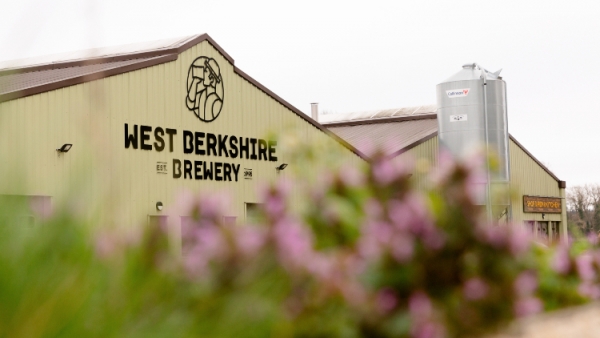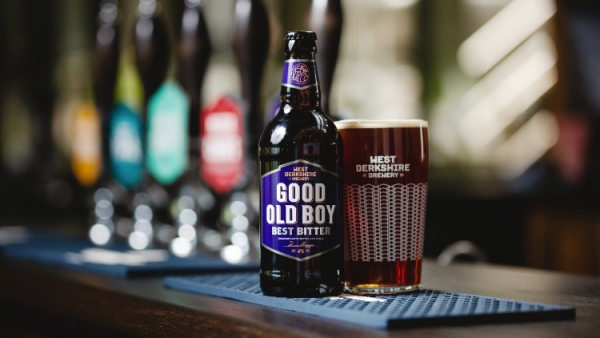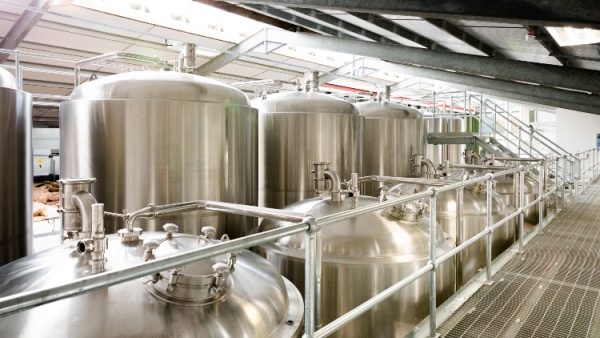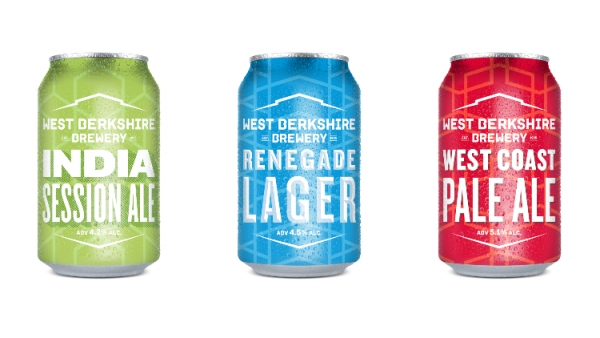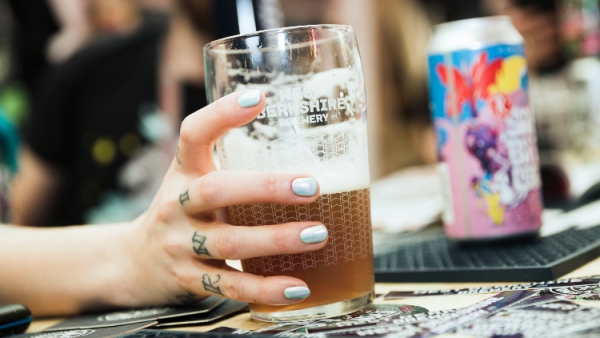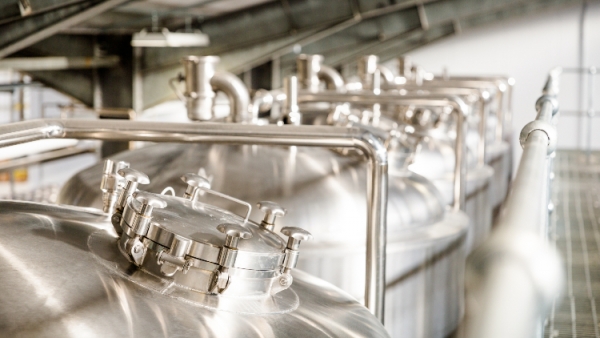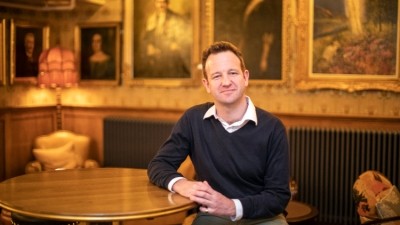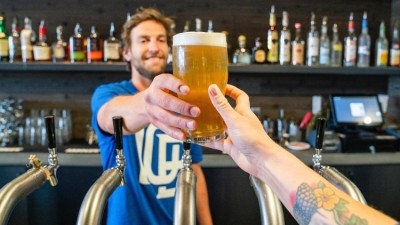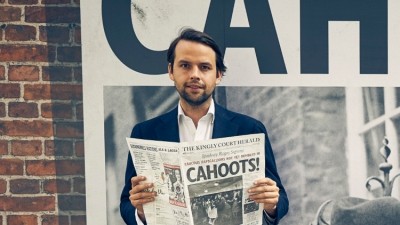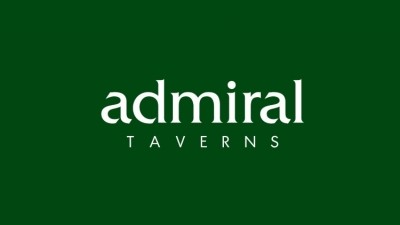Big Interview
'It’s important that we are who we are and not part of a multinational'
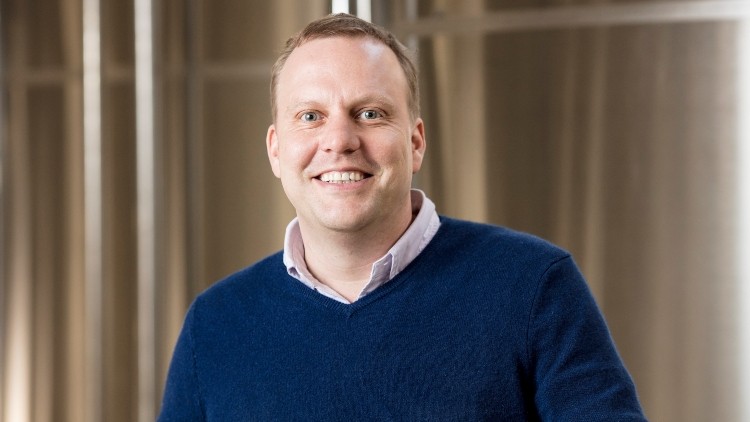
Navigating rural Berkshire’s hedgerowed maze of chocolate-box villages, tree tunnels, and signposts emblazoned with names like Tutts Clump, Stanford Dingley and Scratchface Lane, you’d be forgiven for thinking you were driving through an episode of The Archers.
Yet as managing director Tom Lucas explains, sat on the sun-drenched patio outside West Berkshire Brewery’s £9m pistachio-coloured home in Yattendon, his company operates on a different frequency.
“I bloody love Radio Six,” he says. “I love the fact that they champion indie music, independent venues and give airtime to people who don’t have a label. It’s run by absolute passionate nutcases – and it’s brilliant.
“I love giving a voice to things that aren’t necessarily cool or that other people aren’t shouting about – there’s value to be had in folk music as much as there is in classical, jazz or techno.
“That’s where we come from with our love of beer – from a standard ordinary bitter like Mister Chubb’s to a double IPA like Snake Oil – eclectic, independent minded and run with passion.”
Trading places
He says a visiting friend recently recalled him voicing ambitions to become a brewer while at university – “obviously, I can’t actually remember saying that” – but, by his own admission, Lucas “fell out of university” and into the trade in 2003 through a love of beer.
“I had this job in a warehouse, packing boxes for Sony, and it was really mind-numbing,” he says. “It came to an end over Christmas and I walked into my local pub down the road and told the landlady that my job was finished. She asked, ‘why don’t you come and work for us?’ I replied, ‘that’s very kind, thank you very much’ to which she said, ‘no it’s not really that kind, you owe us £350 on your bar bill’.”
Yet, nearly 16 years since his first bar shift on New Year’s Day 2004, Lucas has moved light years from having to ask what a white wine spritzer is.
“Dave Maggs, a founder of West Berkshire Brewery, taught me cellar work as part of joining the pub because the landlord had got poorly. From very early on, as a 24-year-old, it was about cask beer and looking after it.”
However, realising – as much as he enjoyed it – working behind a bar wouldn’t pay the bills forever, Lucas pursued qualifications with the Association of Chartered Certified Accountants (ACCA).
“But it was absolutely impossible to get a job in accountancy if you didn’t have a degree and if your only job experience is working behind the bar in pubs,” he acknowledges. “They tend to think you’re a liability.
“I was putting myself through the ACCA when I was talking to Dave Maggs and his business partner Andy Baum, who said ‘we’re getting bigger, why don’t you come and work for us?’.
“That was in 2008 just before my 28th birthday. I joined West Berkshire Brewery as the first member of staff who wasn’t a director to work in the office at the brewery.”
Pioneering English beer
Joining the business more than a decade after it was founded in 1995 by Dave and Helen Maggs, Lucas was one of six staff embarking on a “journey towards a professional business while still basically being enthusiastic amateurs”.
“It was a lifestyle business and they were pioneers of the microbrewing industry,” he says.
“It was a real struggle. You had to really love it as there wasn’t any money in it per se.
“When I joined, I was there because I loved drinking and I loved the beer – English beer – and it was almost a revolt against what had come before. In the ’80s and the ’90s, beer was dominated by big commoditised brands and actually wasn’t very interesting. But pioneers like Dave and Helen really amplified the message that we shouldn’t forget our heritage as a nation of brewers and that actually there was more to beer than what we had been given.
“I remember when BrewDog started, they helped pioneer a seismic shift in how beer can be perceived and what it’s about. They weren’t the first, they were very loud and did very well, but we’re all part of that movement towards better products.”
Lucas acknowledges that alongside the beer industry, West Berkshire Brewery has undergone significant change during his years in the trade.
“One of the biggest moments for me was with David Bruce, who joined as chairman in 2013. He and I were having a beer and a chat about what to do and where to go.
“I took him to a disused pig farm up the road and said I’ve got an idea that we could throw up a large agricultural building, put in place a brewery that’s scalable with a packaging line in the middle of the country, put a taproom in there and really try to make something a bit special.
“Previously, we’d always done the classic small brewer thing of investing in a small brewery then realising that we needed to move again. I think we were on our fourth site and fifth plant by the time we moved up the road in 2011. It was about how do we grow a business but then also what the vision was.”
Modernity and tradition
According to Lucas, the £9m revamp of West Berkshire Brewery yielding a 12-fold production increase – built on the disused plot he successfully pitched to Bruce – marks the next phase in evolution rather than revolution for the company.
“It’s not a sea-change in our goals, culture or anything other than we’ll be running more than one shift,” he explains. “We’ll still remain who we are as a family business – slightly dysfunctional.” The refurbishment itself encapsulates the company commitment to both vintage and vogue. A rustic, lodge-like restaurant, taproom and bottle shop – featuring barrel stools, kegs and traditional pump clips and handles – for example, includes a window into the brewery that allows visitors to see enough stainless steel kit to rival a Bond villain’s hideout.
“We’re a blend of tradition and modernity,” Lucas explains. “It’s an interesting dichotomy, a juxtaposition of the heritage and the rural with the modern and the industrial.
“We all grew up loving the product and looking to take it forward – that’s probably our stand-out characteristic, our love for the old but also the move towards best practices and the best ways of doing things.
“It’s all about balance from the flavour of the beer onwards,” he adds. “We’ve got a great brewery, technically great brewers and great kit – modern science helps make our traditional-style beers better and more consistent than they ever were. The two go hand in hand.”
Industry challenges
Given the brewery’s latest success at the 2019 Great British Beer Festival – the bronze award in the mild category with Maggs’ Magnificent Mild – it’s an approach that appears to be working.
“It’s a highly competitive market dominated by big brewers who have economies of scale and a route to market,” Lucas explains. “There’s a barrier to entry in terms of price. How do you get out there in such a crowded marketplace when everything is so strangled?
“Having said that, the biggest opportunity, I think, is that people are generally demanding better everything – better beer, better TV – thank god for Line of Duty.”
What’s more, while striving to deliver excellence and stand-out appeal in a crowded market, Lucas explains that there’s much to be learned from the competition.
“People like St Austell,” Lucas explains. “Their beers are great and I like that they look after their pubs very well because pubs are part of our DNA as British people, they’re one of the things that make us different and they need stewardship.
“New Belgium Brewing as well, I was fortunate enough to meet the guys from there a while ago and they’ve got this dedication to quality at scale but the thing that was really cool about them was that it’s an employee-owned company.
“They’ve got this huge collection of like-minded people working towards the same goal – I find that equally inspiring, it’s an exciting culture and, of course, they share a lot of the same cultural values as we do in terms of environmental impact.”
West Berkshire Brewery’s green credentials run far deeper than its brewery’s pistachio façade. As part of its recent revamp, the brewer spent more than £1m on eco-friendly equipment and measures to make its business more sustainable.
“Things only change if people make change so, as part of our dedication to doing our bit, we’ve invested in environmentally friendly packing equipment – recycled can handles, cardboard packs that we can pack our bottles and cans into. All of that is about putting your money where your mouth is and doing what you think is right as much as is for commercial benefit.”
Lucas is unequivocal that brewers have no excuse not to take steps to preserve the environment and make their business greener regardless of whether it puts a dent in their bottom line.
“They should even if it does,” he says. “There’s no excuse for not focusing on sustainability.
“If we are a society that believes we need to be doing this, it’s incumbent on everybody to pull their weight, frankly.”
Deal or no deal
On the subject of green issues...less than a week after meeting Lucas at West Berkshire Brewery, Hong Kong-based property business CK Noble announced that it planned to purchase Greene King – the operator of more than 3,000 pubs – for £4.6bn.
The reveal followed a series of big beer deals, including Asahi purchasing Fuller’s beer business, Kirin-owned Lion acquired Magic Rock, and Heineken claimed a minority stake in Beavertown to name but a few.
Taking an upbeat stance on the wave of activity, Lucas explains: “It feels like a bit of a natural evolution in the life cycle of the industry. It feels like consolidation was bound to happen.
“It’s a shame that some of the longer-standing brewers have decided to sell but these things are natural.
“This industry is moving incredibly quickly at the moment with Asahi taking Fuller’s and now trying to compete with Heineken and Molson Coors. That macro level is slightly above where we are, we’re competing on a much smaller scale.
“I don’t see it as a bad thing. One of the things I thought when I was getting into this was if our mission is just to make sure that people are drinking better beer but then there’s the fact bigger companies are buying breweries that are making better beer so that’s going to be better for consumers. That’s one way of looking at it.”
But would West Berkshire Brewery ever consider selling up? “Not really,” according to Lucas.
“We’ve got 1,500 shareholders so we’ve got to provide liquidity for them at some point but that doesn’t have to be a sellout,” he explains.
“I’d quite like to be doing employee ownership or market listings, but I don’t really want to give up our DNA and our heritage. It’s quite important that we are who we are and not part of a multinational.”
Pub ambition
Pubs form an important part of this DNA according to Lucas, who harbours ambitions to expand West Berkshire Brewery’s burgeoning estate.
At present, the company operates four venues through a partnership with Maverick Pubs: the Grapes in Oxford; plus three London sites – the Oxford Tavern in Kentish Town, Old Suffolk Punch in Hammersmith, and the Depot in Caledonian Road, Islington.
“For me, pubs are about providing a safe place for people to enjoy themselves together while drinking,” he says. “They’re incredibly important for communities.
“Not having the local pub means some of the older guys don’t get to see anybody, you get loneliness. I’m very much a supporter of pubs feeling like a place where everyone can go – they should be inclusive. Our pubs are all of those things. They’re not branded, they’re not themed, there are no water slides or crazy golf courses and you can’t throw an axe in one of our pubs – you’ll get in trouble. The emphasis is on great beer and an inclusive, safe environment with great food and drink – that, for me, is the key.
“I’d like a small estate of high-quality pubs. I’d like us to have about 10, I suppose. They’re important.”
Yet with ambitions for a lager pub estate come concerns over the rate at which pubs are closing their doors for good.
“Around here there used to be six pubs within walking distance,” Lucas says. “Pubs are dying for economic reasons. Property prices increase and it’s hard to make a living as a publican. It’s especially hard to make a living as a publican when rates are high, beer is expensive. Beer duty, when you compare it to cider or spirits, is a huge amount. The price of a pint since 1998 – I remember at the Pot Kiln was 84p, now you pay a fiver.
“We should be paying tax and providing society with the benefits of that tax, but it does feel like, as an industry, brewers are paying more than their fair share and that impacts all the way through the chain right down to the publican and the customer.”
